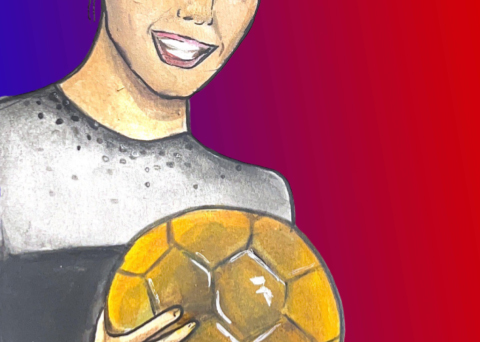Each year, professional soccer players’ achievements culminate in the Ballon d’Or ceremony. At the event, invitees witness the presentation of the Ballon d’Or––the most prestigious award in soccer. Considering both national team and club accomplishments, the best player from the past year receives the Ballon d’Or. This year’s celebration took place on Oct. 30 in Paris, and the winners were Inter Miami’s Lionel Messi and F.C. Barcelona’s Aitana Bonmatí. Although the Ballon d’Or ceremony serves as an exciting occasion that publicly recognizes players’ achievements, FIFA’s poor planning of the women’s portion of the event soured the tone.
Messi’s Ballon d’Or win was somewhat expected. He not only captained the Argentinian national team to the 2022 World Cup title––a tournament in which he created the most chances of any player and scored seven goals––but also almost single-handedly helped bring Inter Miami from a struggling team at the bottom of Major League Soccer’s Eastern Conference to a Leagues Cup winner and an Open Cup finalist. Although runner-up Erling Haaland’s goal tally since joining Manchester City is impressive, getting on the scoresheet with the help of brilliant chance-creators like Kevin De Bruyne and Bernardo Silva is very different from building up a low-ranked team.
The women’s Ballon d’Or winner, Barcelona’s Bonmatí, was even more clear-cut than Messi—and rightfully so. On the 2023 World Cup-winning Spain squad, she stepped up in the absence of Spanish star Alexia Putellas and was recognized as the tournament’s best player with the Golden Ball. The midfielder has also been a significant contributor to the record-breaking F.C. Barcelona side that had a 62-game win streak until May of this year. Despite being surrounded by a strong team, Bonmatí’s abilities still clearly stand out, and her talent goes beyond the measure of her 94 career goals. The rest of the women’s rankings were equally star-studded, featuring Samantha Kerr as the runner-up and Mary Earps and Rachel Daly in the top ten.
Outside of the solid nominations and eventual ranking, the women’s Ballon d’Or ceremony left much to be desired. Scheduling and logistical choices made it seem that women athletes were just an afterthought in the grand scheme of the ceremony.
Several winners and nominees were not even present to receive their awards. The ceremony was scheduled during the women’s international break, the time during which players compete with their national teams. This forced many athletes to choose between attending the ceremony and helping their country qualify for the 2024 Olympics––which features the main national team in women’s soccer, rather than the U-20 teams like the men’s tournament––with many athletes not even permitted to attend as a result. When considering how prestigious both the award and the ceremony are, and the amount of annual attention and preparation it receives, this was extremely careless planning. A Ballon d’Or ceremony would never happen during a men’s international break, especially if the international matches were important qualifiers for a tournament.
Soccer legend David Beckham, the president of Messi’s club, Inter Miami, presented the men’s Ballon D’Or. The choice seemed meaningful and personal––it was clear that the pick was intentional. Bonmatí, on the other hand, was presented her award by the much more underwhelming choice of Novak Djokovic. FIFA was apparently not only unable to get one of the many legendary female soccer players to present the award––someone like Christine Sinclair or Abby Wambach––but also failed to delegate the task to a female athlete in general. Djokovic has no connection whatsoever with women’s soccer and has actively denounced equal pay for women athletes. The choice was not only incredibly lazy but extremely disrespectful to women’s sports as a whole.
For the women’s game to grow and for female soccer players to be treated with the respect they deserve, equitable treatment needs to start at the top of FIFA. There is no excuse for treating these women as a mere accessory to the main event of men’s soccer.









